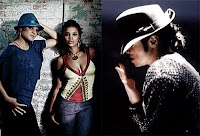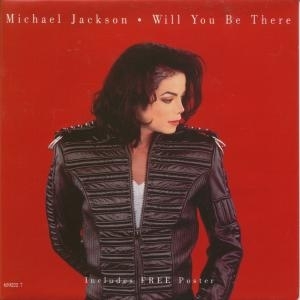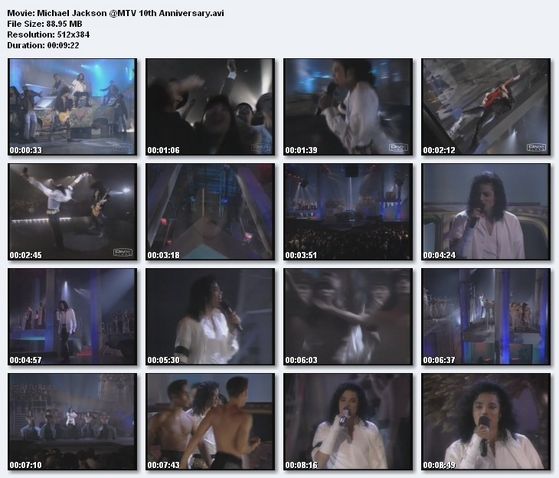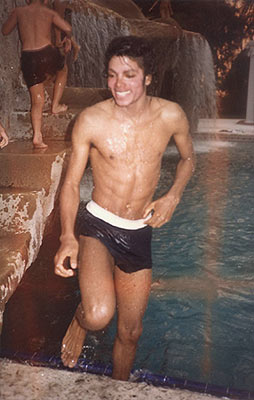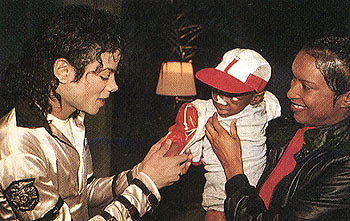Will You Be There - Ode to Song
Michael Jackson first revealed Will You Be There to the world when it featured as the eleventh song on his 1991 album release 'Dangerous'. Penned solely by Michael at the height of his career, this initial 7 minutes and 40 seconds version of the song became an instant favourite of fans the world over.
The first time I heard Will You Be There, I was captivated by the intensity of emotion conveyed by Michael in both his voice and lyrics. I can still remember sitting at eight years old, engrossed in writing out the lyrics over and over again in an attempt to decipher Michael's true intent behind these profoundly impassioned, almost haunting words.
From its opening segment featuring Beethoven's Ode to Joy and choral introduction by the Andrae Crouch singers to its emotionally exhausting finale, the song mesmerizes its listener from start to finish. It is this incredibly captivating effect which has inspired me to write this tribute piece. I do not feel the song has ever received the credit it unquestionably deserves, nor been truly revered outside the Michael Jackson fan circle for its incontestable excellence.
In this written tribute, I am going to share with you some facts, opinions and theories behind what is doubtless in my mind the greatest song of all time: Will You Be There.
The Facts:
------------------------------
After sitting on the Dangerous album for almost two years, Michael decided to release Will You Be There as a single in July 1993 to coincide with the release of the Warner Brothers film 'Free Willy'. The song became the theme tune to the movie telling the story of an unbreakable friendship between a young boy and a killer whale. Two versions of a video were released to accompany the single - the principle version featuring shots of Michael on his Dangerous world tour interlaced with shots of his appearance on MTV's 10th anniversary awards show; on both occasions performing this song. The second version featured accompanying outtakes from Free Willy and later featured as bonus material on the movie's DVD release. The videos first aired in May 1993 and were directed by Vincent Paterson - who would later direct the video for Michael's 'Blood On The Dance Floor' - and produced by Joel Gallen and Ute Leonhardt.
As a single release, Will You Be There achieved great success as it reached number 11 in the UK, sold over 500, 000 copies in the USA and was certified gold. It also reached #1 on the MTV Eurochart. The single was available in CD, LP and cassette format, the LP format featuring its own collectors edition poster bag. The chosen B-side to accompany the single was the song 'Girlfriend' from Michael's Off The Wall album. The most notable difference between the single and album versions of the song is the omission of the Beethoven segment as the song's prelude.
Michael wrote and produced Will You Be There - with co-producing credits going to Bruce Swedien - and orchestrated the rhythm and vocal arrangements. Featured instruments are noted as piano, synthesizer, keyboard, drums, and percussion. In 2002 he told an ITV documentary it was written at his Neverland ranch, in what he calls his Giving Tree: "I've written so many of my songs in this tree. I wrote... Will You Be There..." (Living with Michael Jackson, aired Feb 2003).
The 1994 MTV Movie Awards pronounced Will You Be There 'Best Song' for its accompaniment to Free Willy. To date, Michael has performed this song only on the Dangerous tour, MTV's 10th anniversary show, and very briefly at the NAACP Image Awards in 1993.
A complimentary review of Will You Be There follows:
"Having dipped his toe in the turgid pool of heavy metal he plunges headlong into inspirational gospel. A choral arrangement lifted from a performance of Beethoven's 9th Symphony by the Cleveland Orchestra opens this BIG track (and resulted in a $7 m lawsuit against Jackson, his MJJ Productions company and Epic - which Sony settled out of court). Later copies of the album and CD which credit Ludwig van B's part in the track. Again, the tune and arrangement have familiar progressions but his voicing against the full might of the Crouch Choir is unexpectedly passionate. A gospel album might have great artistic rewards. He ends the track with a spoken prayer which will have considerable resonance during the next few years. Two "special" versions of the song appeared on the soundtrack to the Free Willy, a movie about a boy and his friend, the Killer Whale."
- Complete Guide to the Music Of Michael Jackson & the Jackson Family, Geoff Brown (1996)
As mentioned in the above quote, the song brought with it its fair share of legal issues. First was the omission of any credit to the Beethoven piece in the Dangerous album booklet, resulting in a massive lawsuit from Beethoven's camp filed against the above-mentioned parties. Secondly, in 1992, a little-known singer named Albano Carrisi filed a lawsuit accusing Michael of copying his 'I Cigni di Balaka' ('The Swans of Balaka') song, a suit which in total would last seven years. In 1997 an Italian lower court ruled against Carrisi, which he followed up with an appeal. On November 3rd 1999, a civil court in Milan rejected his appeal, confirming the lower court's judgement in favour of Michael and ordering Carrisi to pay legal expenses to both Michael and Sony.
Michael also wrote an extended version of Will You Be There for his book 'Dancing The Dream' (released June 18, 2002), which carried new additional lines towards the end of the song. This longer version will be shown and compared to the original at the end of this page. An interesting question would be whether this was in fact the original version of the song which had been condensed for the album, or if the 'new' verses were simply added at a later date for the book.
The Song:
------------------------------
The greatest reason for my deciding to analyse Will You Be There stemmed from my realisation that no one, not even myself, truly knew the meaning waiting to be discovered between its lines. Most commonly classified as a love song, the lyrics speak of an intense, at times desperate longing for affection - but from whom? Rarely spoken of by Michael himself, Will You Be There carries a message seeming almost to lie dormant in the ears of the listener - a song felt but never completely understood by its fans.
This message I hope to at least partly decipher in these following pages. Perhaps one day Michael will unlock the secrets of the song, but until that day Will You Be There will forever remain an unsolved mystery to even its most devout fans.
Before attempting to analyse the possibilities, I feel it is important to have truly heard this song. The emotion of the music - the anguish, the despair and incredible sadness. The effects Michael uses both musically and vocally play a crucial part in the song's message and its perception to the listener. There is no doubt, if nothing else, it certainly draws the listener in to an incredible degree of empathy towards Michael as both singer and author, as detailed below.
The dual introduction with Beethoven and Andrae Crouch immediately sets the tone for the song; the spiritual intensity of the voices demonstrating right from the beginning that this will be no ordinary Michael Jackson song.
The first verses are sung slowly, in tones deeper than those Michael usually employs - possibly to signify the depth and rawness of the emotion. The slow delivery of the lines ensures the point is laboured - the despair and yearning evident in his voice throughout.
The bridge of: "everyone's taking control of me," takes on a more intense, more desperate resonance - Michael's punching out of the lyrics demonstrating the anger and helplessness he feels at his situation, whatever that may be.
Throughout the entire song, Michael's vulnerability is evident, the Andrae Crouch singers coming in in the background to support him as he repeats lines such as "carry me" and "hold me" continuously.
Confused and frustrated, he similarly punches out the line "but they told me," again, to show the listener just how alone he truly feels. At this point, his voice begins to sound harsher and more angry as if he feels truly helpless and lost, as if he simply does not know how to be the person he feels he should.
At times, such as the line, "when lost will you find me," Michael uses two layers of his voice - possibly to convey the mix of emotions. The two voices merge together in unison, resulting in a more poignant delivery of the selected lines.
Gradually, as the song proceeds, Michael's voice gets more and more impassioned as he sings louder and with increased intensity, pulling in the listener and forcing them to pay attention to what he has to say while the choir support him relentlessly in the background, emphasising every word.
Just as the song reaches its climax, it falls back and releases the listener from its grip. The beat softens and the choir chorus more slowly, before Michael begins to softly speak. In a faltering, unsteady but determined voice, Michael pleads with the listener for their empathy and support, regardless of what the future may bring.
The most significant part of the song is undoubtedly the closing lines, when Michael's voice starts to break as he begins to lose control, culminating in his speaking the last line through tears. The song closes with the emotion still hanging in the air, as palpable as the reassuring beat steadying it throughout.
The Theories:
------------------------------
The three hypotheses I have conceived are as follows. Either the song is 1) a hidden prayer - a hymnal manifestation of Michael's religious ideals, or 2) an anthem aimed at his fans - the very people who would most likely connect with its message, or finally, as assumed by so many for so long, 3) it is simply a love song and nothing more. The second is the theory most commonly believed by Michael's fans, the latter by the music industry and the first has never fully been considered to my knowledge.
Theory 1
There are a number of clues I feel point to the possibility that this song could actually be intended as a message to God himself. Deeply religious, Michael has frequently spoken of his feelings towards God and his seeing Him in everything he does and is it my belief Will You Be There could be a heightened elaboration of some of those feelings.
"I wrote Will You Be There at my house in California.... I didn't think about it hard. That's why it's hard to take credit for the songs that I write, because I just always feel that it's done from above. I feel fortunate for being that instrument through which music flows. I'm just the source through which it comes. I can't take credit for it because it's God's work. He's just using me as the messenger."
- Ebony Magazine, 1992
The full seven-minute version of the song as it appears on the Dangerous album begins with a sampling of Beethoven's 9th Symphony - "Ode To Joy" - a song which speaks of the creator and his subjects on earth:
"Ihr stürzt nieder, Millionen?
Ahnest du den Schöpfer, Welt?
Such ihn überm Sternenzelt!
Über Sternen muß er wohnen."
("Do you come crashing down, you millions?
Do you sense the Creators presence, world?
Seek Him above the starry firmament,
For above the stars he surely dwells.")
It is curious in my opinion why a love song would feature such an introduction.
The introduction and opening notes of Michael's song itself begins, as previously mentioned, with a gospel style choral song by the Andrae Crouch choir, reminiscent of the chords sung on innumerate church hymns, further indication of the song's spiritual intentions.
The lyrics themselves commence with the line, "hold me like the river Jordan." This river is highly significant in biblical tales as the river between Syria and Israel where Jesus himself, as well as the people of Jerusalem and Judea, were baptised by John. According to the bible after Jesus' baptism, heaven opened above the river and God appeared in the image of a dove.
"
Then cometh Jesus from Galilea to the Jordan unto John, to be baptised of him... And Jesus, when he was baptised, went up straightaway from the water, and lo, the heavens were opened unto him, and he saw the Spirit of God descending as a dove, and coming upon him".
Matthew 3:13
The use of the word "thee" in the line, "I will then say to thee," is also indicative of the God-like inference and the possibility that Michael was in fact using this song as some form of outlet, perhaps for religious frustration.
There is no doubt the undertone of Will You Be There is a deeply spiritual one. I wonder, in the vein of my first theory: could the words "carry me", repeated throughout, be reminiscent of Saint Christopher carrying the child Jesus across the great river?
The use of the religious theme can also be seen in the song's video - the dance routine encompasses prayer-like interaction between Michael and his dancers, especially as at one point they lift him above their heads and gather round him, almost as if they are raising him up as a god among them. At the end of the video, as Michael recites the spoken verse which closes the song, an angel descends from above and wraps her arms around him, ending the video.
Overall, in my opinion, there is sufficient evidence this song could indeed have been written by Michael to serve as a personal address to God.
Theory 2
Another theory, and the one most commonly believed by those it relates to, is that the song serves as a message to Michael's fans. The reasons supporting this are endless - the very title of the song, written at the height of his popularity, appears to set the tone for Michael's first musical statement to his followers, a theme which would be repeated by him in the future on various offerings.
The lyrics are a clear message that Michael is looking for unconditional love - the question is, from whom? He is at times almost begging the listener to support and care for him, rendering it impossible not to be inflicted with even slight sympathy for his apparent plight.
The bridge of: "everyone's taking control of me, seems that the world's got a role for me, I'm so confused," can surely only be referring to his overwhelming and, at times no doubt unbearable, lifestyle. Constantly deified and adored by millions, here he seems to be relaying just how this feels for him, and his longing to be seen as a person by his droves of smothering followers. This longing is most obviously demonstrated by the lines, "but they told me a man should be faithful and walk when not able, and fight to the end but I'm only human".
No one is more aware of how he is perceived by the world than Michael himself. Fans, media and critics seem simply to go crazy over him - he can do nothing, go nowhere. Looking at the song from the point of view that it was written to fans, it becomes glaringly obvious that this song is a cry for help, especially as Michael knows only too well the people most sensitive to its pleas would be the very fans themselves.
A further sign of this song possibly being written to the fans is the method in which it is sung - the choice of words used to convey his longing. The line: "but they told me," begs the question - who exactly is being referred to here? This line could be another hidden message regarding his fame - the word "they" implying those around him, coaching and teaching him, have advised him he must be a certain way, and this is his attempt at breaking free from the suffocating limitations impressed upon him.
Michael further demonstrates this in lines such as, "lift me up slowly, softly then boldly," almost as if he is relying on the love of his fans to keep himself together, showing his vulnerability and possible desire for reassurance that the fans truly love him and will be strong and defiant in that love.
The portion of the song which cements this particular theory in the fans' minds is the spoken verse at the end. In his entire career, there has surely been no clearer message to his fans than the words he so painfully relates as Will You Be There draws to a close. Michael's choosing to speak, as opposed to sing, the lyrics acts as a method of relating more intimately with the listener, giving the listener a more personal slant to the song which ultimately enables Michael to portray the image of his humanity far more effectively. No longer the entertainer, he speaks clearly and slowly, pleading with the listener simply to hear him. The questions he asks in this closing sequence surround the many possibilities which Michael feels his life may lead him to - the chance that he may fail, he may disappoint, he may just turn out to be only human after all.
He tearfully ends this spoken verse by saying that through all the sorrow and pain, things will always get better. His promise of "another tomorrow" suggests a message to the fans that he will always be there, just as he is begging them to be there for him now. The last few lines of the verse are almost a promise of eternity; that his love will continue forever in their hearts.
A side note on this spoken verse is the spookily prophetic inclusion of the words, "in my trials and my tribulations, through our doubts and frustrations" - an interesting choice of words since mere months later he would face the biggest trial of his life in the 1993 allegations - filed the same year the song was released.
Theory 3
The final theory I have encountered of the meaning behind this song is that it is written to a lover. This realisation first occurred to me many years ago when I saw advertised an upcoming album compilation of great love songs. Will You Be There was included, which greatly surprised me at the time, as I had frankly never considered the lyrics to be indicative of that particular mode of love.
In analysing the song for this piece and in speaking to a number of fans, I can see now how it could be perceived as such a love song.
Requests such as, "hold me, carry me, love me," appear to be clear requests for someone to play a major part in his life. My personal theory, assuming this is indeed perceived as a love song, is that Michael has written this to a fictitious lover; an illusion he has fashioned in his mind as the perfect love - something Michael Jackson appears to have been searching for all his life. This song seems to signify all the questions he has in his mind about this love he has created, and whether it really exists as honestly as he needs it to.
He is clearly vulnerable, reaching out for someone to take care of him. The line, "carry me there" - evokes a similar question to those asked above - to where is he wishing to be carried? Could it be to a place of safety or, as per this final theory, love?
Alternately, the line, "but I'm only human," could be a sign that he can no longer cope with the trials of life alone. Similarly with the line, "I get lonely," which is sung over the lyrics twice and an interesting statement for inclusion in the consideration of the theory being explored here.
In the spoken outro, Michael promises, "I'll never let you part," at which point his voice begins to break. Of course, this could be applied to whichever theory you choose to believe, but it is in my opinion most believable this is directed to the love he so desperately craves. Perhaps here he is stating how if this fantasy love figure were in fact to support and love him, he would reciprocate this by ensuring such a love remained in his heart forever.
The extended version of the song features lyrics such as, "needing you only," "heal me and bathe me," "hug me and shield me," and, "face me and kiss me." In my opinion, there is no clearer explanation for these lines than their intended inference towards a lover, as they can surely not be applied to any other theory offered in this piece.
The inclusion - and amendment - of Will You Be There in the 'Dancing the Dream' poetry book mentioned earlier is also an interesting fact. It begs the simple question why, in a book of new and previously unreleased work, Michael would choose to include a song written years earlier, and why that same song would be Will You Be There. In a book filled with heartfelt and intense verses about love, Will You Be There sits proudly amongst them, with its newly added verses. These new verses are the strongest indication yet that this could easily be a love song. Without them, it can be about anything the listener chooses to believe, yet the added verses bring with them an entirely different angle to the song.
Conclusion:
------------------------------
Of course, analysing Will You Be There and Michael's true feelings portrayed through its lines is an endless task. Lines seemingly so innocent and simplistic upon first listen adopt a whole new perspective when studied in depth. Of course, only Michael himself truly knows the story behind Will You Be There and the message he was trying to convey, and until he decides to share that message with us it will no doubt remain forever undiscovered in all its cryptic glory.
A song can be heard in a multitude of alternate ways and a listener will always derive all varieties of emotions from those ways. I personally think the song is about the emotion of love itself, and the variety of forms love can take. As I have attempted to portray in these pages, this love could be for God, fans or a lover - yet the possible intentions are endless.
In conclusion, I personally believe as long as you go wherever your heart leads you with Will You Be There, Michael's message has been communicated exactly as he intended, and he has achieved everything he set out to in the penning of this breathtaking and exceptional ballad.
- L.J. Sheridan © 2005
Source:
http://www.fanpop.com/spots/michael-jackson/articles/23576/title/will-ode-song




